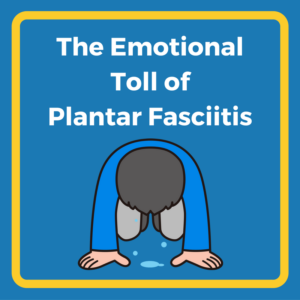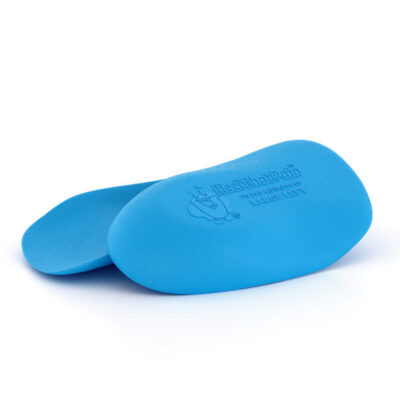 Plantar fasciitis is a physical condition–but it can also be a deeply emotional experience. Dealing with chronic pain and experiencing discouragement in your efforts to find a solution can be exhausting, frustrating, and infuriating. Studies find that people who suffer from chronic pain are three times more likely to suffer from a mood disorder as well.
Plantar fasciitis is a physical condition–but it can also be a deeply emotional experience. Dealing with chronic pain and experiencing discouragement in your efforts to find a solution can be exhausting, frustrating, and infuriating. Studies find that people who suffer from chronic pain are three times more likely to suffer from a mood disorder as well.
Can plantar fasciitis cause depression and anxiety? Or, can depression and anxiety ever lead to the development of heel pain? In this blog post, we’ll answer some common questions about the connection between mental health and heel pain.
Can Plantar Fasciitis Cause Depression or Anxiety?
It’s not just the toll of navigating chronic pain that links it with mood disorders like depression. Dr. Michael Moskowitz, board member of the American Pain Association, says, “If you look at the nine places in the brain where pain occurs, six of them are where we experience mood disorders like depression and anxiety.” In other words, physical pain and emotional pain are intertwined–literally.
Whether you’re suffering from a combination of chronic pain and depression or anxiety, or are battling higher levels of frustration, hopelessness, and anger, you are not alone. There is help and hope.
Can Anxiety, Depression, or Emotional Stress Cause Plantar Fasciitis?
While depression or anxiety can certainly be byproducts of chronic pain, there’s some evidence suggesting that emotional stress can increase your chances of developing plantar fasciitis.
While heel pain may not be a direct result of emotional distress, it can certainly be a contributing factor for the following reasons:
Increased Oxidative Stress
Oxidative stress— which has been found to be strongly correlated with depression, anxiety, and other types of emotional stress— is also strongly correlated with inflammation in the body. If you’re dealing with high levels of oxidative stress because of depression or anxiety, your plantar fascia may be at increased risk for injury and inflammation.
Changes in Exercise Routine and Diet
If you’re dealing with anxiety, depression, or another type of mental distress you’re likely eating and exercising differently than you might otherwise. Sudden weight gain because of dietary chances can put extra strain on the arches of your feet. Likewise, a sudden increase or decrease in activity level can result in less flexibility of the muscles and tendons in the feet, or extra force and strain that leads to injury.
Coping with Chronic Pain and Depression or Anxiety
If you suspect that your anxiety or depression may be connected to your chronic pain, there are things you can do to care for your emotional wellbeing while you treat your physical pain:
Maintain Self-Care
The mind-body connection is strong. While it’s not always easy to care for yourself physically when you’re not feeling 100% mentally, self-care can make a big difference to your mental and physical health. Make time to rest properly, drink enough water, eat nutritious food, spend some time exercising in whatever way you can, connect with the people you love, and follow your doctor’s recommendations for any medications or treatments you’re trying.
Find Your People
Reaching out and getting involved with a group of individuals who experience the same type of chronic pain you do can be immensely helpful. There are online support groups on Facebook and across the web, or if you prefer face-to-face interaction you can check out meetup.com for local groups, or talk to your local hospital for suggestions and leads. Not only will talking with people in a similar situation help you feel less lonely–it’ll also serve as a great source of new ideas to try, inspiration, friendships, and laughter.
Try Talk Therapy or EMDR
Talk therapy can be a terrific way to work through the emotional angle of dealing with chronic pain. It’s all too easy for sufferers of chronic pain to isolate themselves or withdraw from friends and family, fearing “compassion overload” for an ongoing condition.
Spending time talking with a trained, objective professional can be a great way to work through not only the emotional trauma of chronic pain, but also to help you navigate relationships and relate to friends and family in affirming, helpful ways. Another branch of counseling known as EMDR has also been shown to be particularly effective for targeting the emotional component of chronic pain and trauma. Both talk therapy and EMDR are generally covered by insurance and can provide a tremendous outlet and relief!
Learn About New Developments
It can be hard to try one more new thing–especially when you feel like you’ve tried it all. It can also be hard to get your hopes up, only to feel even more disappointed when a new therapy or treatment doesn’t pan out the way you’d hoped. However, with new technology, you might find that you’re pleasantly surprised by some of the options available–especially when it comes to noninvasive, inexpensive treatment options for plantar fasciitis. Keep your ear to the ground, and pay close attention to volume and quality of reviews before making an emotional (or financial) investment.
Find a Furry Friend
You don’t have to be an animal fanatic to gain the benefits of spending time with our furry friends to help mitigate the emotional toll of chronic pain from conditions like plantar fasciitis. Studies show that spending time with animals reduces levels of cortisol (the stress hormone), as well as levels of anxiety, depression, and pain.
It’s not 100 percent clear exactly why spending time with animals helps so much–maybe it’s their lack of judgment, steady support, or joy at simply being in your presence. If you don’t have a pet, there are many opportunities to volunteer at your local shelter, helping socialize cats, dogs, and other animals.
Write About Your Experiences
Journaling can be a powerful tool in healing when it comes to chronic pain and its emotional toll. The act of expressing yourself and naming your fears, frustrations, and discouragements can help you quantify them, put them in perspective, and explore unexpected feelings. Keeping a journal consistently can also help you more effectively identify and track treatments that work, patterns in your pain and triggers, and strategies for dealing with pain.
Have Some Fun
For many of us, heel pain limits us in our favorite activities. However, having fun is a great way to instantly boost your mood and improve your ability to cope! Try to find new hobbies and activities that do not involve being on your feet – like crossword puzzles, reading, watching funny videos online, or learning a new language.
The connection between chronic pain and emotional distress is real. And caring for your mental health as you navigate the physical pain you experience from conditions like plantar fasciitis is an important part of healing. One step at a time, one day at a time, you can find support and relief for the physical and mental distress you’re experiencing.




Iv had plantar fasciitis for 4 years now, its aged me instantly, hobbling around like an old lady , not being able to do dance, zumba, or long fast walks anymore, its taken away my dreams of travelling and hiking , now my children are grown ups
I was a healthy 53 when I started with it, I’m now 57, depressed and am losing my enthusiasm
The physio treatment has failed to work and the surgeon will not see me any more as the treatment has failed